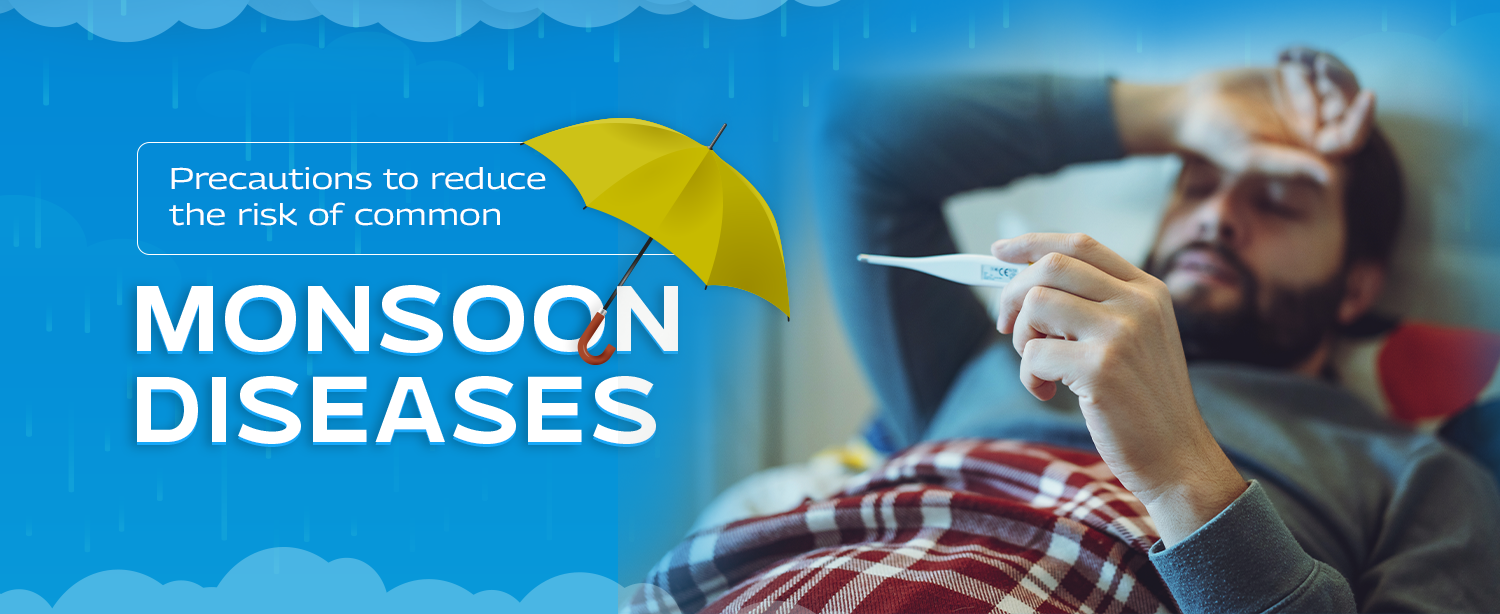As the first raindrops of the monsoon season hit the ground, the landscape transforms into a lush, green paradise. While the monsoon brings relief from the scorching summer heat and fills our rivers and lakes, it also ushers in a host of health challenges. The warm and humid climate of the monsoon season creates the perfect breeding ground for various pathogens, leading to an increase in infectious diseases. Understanding these common monsoon diseases and taking appropriate health precautions, especially for children, is essential to enjoy this season safely.
Tables of Contents
Common Monsoon Diseases
- Dengue Fever
Dengue fever is a mosquito-borne viral disease caused by the Aedes mosquito, which thrives in stagnant water. It may show symptoms such as high fever, severe headache, pain behind the eyes, joint and muscle pain, as well as rashes. In severe cases, dengue can cause dengue hemorrhagic fever or dengue shock syndrome, which needs immediate medical care. - Malaria
Another mosquito-borne disease, malaria is caused by the Plasmodium parasite, transmitted by the Anopheles mosquito. Symptoms typically include high fever, chills, sweating, headache, nausea, and vomiting. If not treated promptly, malaria can lead to severe complications, including cerebral malaria and organ failure. - Leptospirosis
Leptospirosis is a bacterial infection caused by contact with water or soil contaminated with the urine of infected animals, particularly rats. It is common during the monsoon when people wade through flooded areas. Symptoms range from mild fever, headache, and muscle pain to severe complications like kidney damage, liver failure, and meningitis. - Cholera
Acute diarrheal sickness known as cholera is brought on by consuming food or water tainted with the Vibrio cholerae bacteria.It is highly contagious and can cause diarrhea, vomiting, muscle cramps or severe dehydration if not treated promptly. - Typhoid Fever
Typhoid fever is a bacterial infection caused by Salmonella typhi, typically spread through contaminated food and water. Symptoms include prolonged fever, stomach pain, headache,weakness, and loss of appetite. Severe cases can lead to intestinal perforation and hemorrhage. - Viral Fever
The monsoon season sees a spike in various viral infections that cause high fever, body aches, fatigue, and respiratory symptoms. Common viral infections include the flu and other respiratory viruses, which spread more easily due to the humid conditions and close human contact during the rainy season. - Hepatitis A
Hepatitis A is a liver infection caused by the Hepatitis A virus, often spread through consumption of contaminated food and water. Symptoms include fever, fatigue, loss of appetite, nausea, abdominal pain, and jaundice. Good sanitation and hygiene practices can help prevent its spread.
General Monsoon Health Precautions
Children, pregnant women and the elderly are particularly vulnerable to monsoon diseases due to their weakened immune system. Here are some essential health precautions to keep them safe during the rainy season:
- Avoid Stagnant Water
Ensure that children stay away from stagnant water, which is a breeding ground for mosquitoes. Use mosquito nets, repellents, and ensure there are no water collections around your home. - Maintain Hygiene
Teach children the importance of washing hands regularly with soap, especially before eating and after using the toilet. Good hand hygiene can prevent the spread of many infections. - Drink Clean Water
Always provide children with boiled or filtered water to drink. Avoid giving them untreated water from unknown sources to prevent waterborne diseases like cholera and typhoid. - Eat Freshly Cooked Food
Ensure that children consume freshly cooked meals and avoid street food, which may be contaminated. Wash fruits and vegetables thoroughly before consumption. - Keep Surroundings Clean
Maintain a clean living environment to prevent the breeding of mosquitoes and other pests. Dispose of garbage properly and ensure that drains are not clogged. - Proper Clothing
Dress children in full-sleeved clothing and long pants to minimize mosquito bites. Using insect repellent on exposed skin can also provide an additional layer of protection. - Stay Dry and Warm
Keep children dry during the rainy season to prevent fungal infections and common colds. Ensure they wear waterproof footwear and raincoats when going outside. - Boost Immunity
Provide a balanced diet rich in vitamins and minerals to boost children’s immunity. Encourage them to consume seasonal fruits and vegetables that are high in nutrients.
It is essential to take regular health precautions to protect your family from the common monsoon diseases. If you or someone you know develops any serious symptoms of monsoon diseases you must seek medical care and not rely on home remedies. It is important to know the underlying cause behind a fever and seek appropriate care. Reach out to medical experts at Kokilaben Dhirubhai Ambani Hospital to assist you with simple as well as complex health concerns. Call 022 42696969 for appointments or visit our website for further details: https://www.kokilabenhospital.com


